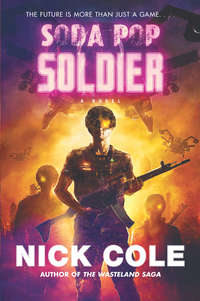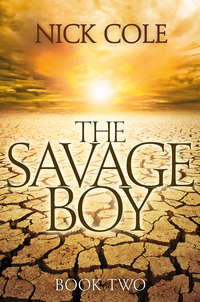
Полная версия
The Road is a River
Maybe I can find her and we can go salvaging in the afternoon. That would be fun if I feel up to it.
“There are worse than those people called the Horde,” proclaimed Pancho above the clamor.
“How do you know that?” someone asked.
“How do you know there isn’t?” replied Pancho.
Quiet.
“We do what that note says and we open a door we may not be able to close.”
Quieter.
“Even now,” continued Pancho, “you are saying to yourselves ‘we have weapons, the tanks, some guns left by the Army.’ Well, you don’t have an endless supply. And do you want to go down that road? Do you want conflict? No, none of you do. You want tomatoes and lemons and homes just like I do. Right now, our greatest weapon is not the Old Man’s tank or our few rifles. Right now our greatest weapon is our invisibility. Whoever sent that man wants to confirm that we are here. They picked up our broadcast, which I advise we turn off immediately, and now they want to know who we are and what we’re doing out here. If we respond to that message, who knows who we’ll be talking to. All I ask is that you consider this. The world isn’t a nice place. It hasn’t been a nice place for a long time. We answer that message and we would be unwise if we did not expect the worst. In fact, we would be stupid.”
“Says they need our help,” said Cork.
“We need help!” shouted Pancho.
More murmuring. A few comments. Cork handed the note to Pancho in defeat. Villagers drifted away. Only a few remained, all in agreement with Pancho. In agreement as he tossed the note into the wind and the paper fluttered down the street.
And then they were all gone and only the Old Man remained, invisible and unconsidered.
He went to pick up the note.
On it was written a message.
To whomever is operating the radio station at Tucson. Please tune your receiver to radio frequency 107.9 on the FM band and send us a message so that we can communicate with you. We are trapped inside a bunker and need help. Beneath that, Please stay away from me. I’m contaminated with radiation.
Chapter Seven
That night the Old Man snuck out of his room and made his way to the radio station the villagers had set up inside the Federal Building.
“Are you sure, Grandpa? Are you sure we should try to contact them?”
He raised a finger to his lips.
His granddaughter nodded, excited to be playing the game of not being found and doing things that should not be done in the dead of night while others slept.
When they reached the radio room they found it unlocked. Inside all was dark. The equipment had been turned off. The Old Man closed the door behind them and for a moment the two of them listened to the silence.
The Old Man switched on his flashlight.
“How does it work, Grandpa?”
“Power. Electronics require power. So we must find the switch or the button or the toggle that will turn it on.”
“Toggle,” she pronounced and laughed softly.
The Old Man searched and just when he had given up ever finding out how to turn on the power, his granddaughter’s thin hand darted forward.
“Is this it, Grandpa?”
The Old Man didn’t know if it was.
“Do you want to try it?” he asked.
She nodded.
“Okay then. Try it.”
She hesitated for a moment and then with only the confidence that the young possess in their movements, she flipped the switch. Soft yellow light rose behind the instruments. Green and red buttons illuminated. There was a faint scent of burning ozone.
The Old Man watched power course through the ancient technology.
After the bombs I never thought I would see such things again.
He found the frequency keypad and typed in the numbers from the slip of paper.
“Grandpa?”
The Old Man stopped.
“What if …” She hesitated and began again. “What if my dad and the others are right?”
The Old Man could hear the worry in her voice.
“They are right.”
“They are?”
“Yes. They are. But that doesn’t make it right to do nothing.”
“I don’t understand.”
“It’s right to be afraid. It’s right to be afraid of what you don’t know. What could hurt you, you should be afraid of that, right?”
“Yes.”
“But sometimes you have to do a thing even if you are afraid to do it.”
“Because it’s the right thing?”
“Yes, and because the world has got to become a better place.”
For you to grow old in.
“Okay then, Grandpa. We’ll do it.”
“You’re very smart. And brave too.”
“You’re brave, Grandpa. Like when you were in the desert.”
“I was afraid too.”
“But brave also.”
If you say so.
“So do we do this? Do we try to help whoever sent the message?” he asked her.
The young girl watched the power coursing through the machine as buttons lit up and needles wandered and settled. The Old Man watched her eyes. Watched her reach a decision.
“Yes.”
The Old Man hit ENTER and a green button lit up. Stamped in black letters upon it were the words “Active Freq.”
The Old Man moved the speaking mic close to his mouth.
“What do I say?” he asked his granddaughter.
She reached forward and pointed at a button.
“You have to push this when you talk.”
“How did you know that?”
“I’ve watched others.”
Of course you did. Nothing escapes you.
“All right, then, what should I say once I push that button?”
She touched her tiny chin with her thumb and forefinger, which was her way of thinking and was a gesture he remembered her first making when she was only three turning four.
“Tell them, ‘we are here.’”
“Just that? ‘We are here’?”
“Yes, just that.”
The Old Man cleared his throat. He moved closer to the mic again and this time took hold of it. His finger hovered over the button his granddaughter had indicated he should push.
He pressed the button.
“Hello,” he began. He looked at his granddaughter. She nodded.
“We are here,” said the Old Man.
“Let go of the button now, Grandpa,” she whispered.
They waited.
And then they heard the voice.
“Who am I speaking with?” The voice was a woman. Older. But clear and crisp. A voice used to giving commands and having them obeyed.
“Us,” said the Old Man who had needed to be reminded that he must touch the button to reply.
“All right,” said the voice cautiously. “Are you operating the radio station that just went active a few weeks ago in Tucson?”
“Yes,” replied the Old Man. “Who are you?”
“My name is Brigadier General Natalie Watt. I’m the commander of forces at Cheyenne Mountain Complex and we need your help. We’re trapped inside our bunker and we need to get out very soon.”
The Old Man and his granddaughter looked at each other in the thick silence of the radio room.
“Are you still there?” asked the General.
“Yes.”
“Can you help us?” she asked.
Pause.
“Yes.”
“Will you?”
Pause.
“Yes,” said the Old Man.
Chapter Eight
The Old Man watched from the high window as his granddaughter slipped back through the quiet streets of Tucson to her family’s home. It was well after midnight.
If I go on this journey, I must go alone. It is too dangerous for her to come with me.
He thought of the route. All the way into California, then back to Nevada, through New Mexico, and up to Colorado Springs.
It is over a thousand miles. The tank can only hold two hundred and sixty-four miles’ worth of fuel according to General Natalie Watt. She said I could scavenge. Tanks can draw fuel from many sources. Even kerosene. There are no guarantees of fuel and then there is the radiation. Well, that would be why you need to go to California for the extra gear. And after I cross all that desert, I am to aim a laser at the back of a mountain surrounded by unknown enemies. A Laser Target Designator. And who are these enemies? The General doesn’t know. She only knows they are trying to tunnel into the bunker and that when they do, they will flood the complex with radiation and kill everyone inside. They only opened the main door once so that the dead man, Captain Roberts, could drive his dune buggy out of the complex.
There is too much for just an old man like me to think about. This is too much for just me.
A one-way trip, my friend. He’d volunteered.
General Watt said the radiation is so bad at the front entrance that Captain Roberts probably absorbed a lethal dose in just the few minutes it took him to drive away. So I cannot take my granddaughter with me to such a place.
The Old Man watched the night.
In my nightmare she is crying for me. I am dying. Just like I almost did after the last time I went into the wasteland alone. She is crying and there is nothing I can do to make it better. The last thing I will ever hear is her grief for me.
It’s just a nightmare, my friend, heard the Old Man as though his friend from the book were with him and they were discussing some problem of fishing or salvage together.
But it is my nightmare.
Everyone dies. What would you have her do? Laugh about it? Of course she will weep.
I was hoping it would be later. When she has her own family and everyone is tired of me. When I have become such a burden to them all that they will be glad to see me go. Then, that would be a good time to die.
She will still cry for you.
Of course.
The Old Man felt the night. Felt its emptiness was only a lie and that all the world and the places and dangers hidden in it were waiting to devour him.
I need to leave soon. In the dream she says, No, Grandpa. I need you. It’s terrible. I never want to disappoint her. I never want to hear her say those words. I never want her to have to say them. Is it too much to ask to just fade away and have no one miss me until I’ve been gone for a long time?
And yet you must leave, my friend. Soon.
Yes. If I leave when no one is watching, just as I did last time, then I will not hear her grief.
Still, you will know. You will know she’ll say that which you do not want to hear. And even if you don’t hear her, in your heart the nightmare will lie to you and tell you that you did all the same.
Yes, that is the thing about nightmares. They embrace us when we are vulnerable, telling lies that seem very real. Like an older child who teases a younger child by making the child believe things that aren’t true.
In our nightmares we are all children.
The Old Man looked down. In his nervousness he had picked up his copy of the book. The one he had read for those forty years in the desert. The one with his friend inside.
The Old Man settled into his sleeping bag. He held the book in his hands and watched the ceiling.
So we will go together, my friend?
Yes.
The Old Man listened to the soft howl of the wind outside the large windows.
Soon I will be asleep and tomorrow all this might have just been a nightmare. Things will be different by the light of day, right, Santiago?
They are trapped in the bunker, my friend. They need someone to come and help them.
Yes.
She said she was going with you.
Yes.
And you must leave soon.
Yes, that too.
Chapter Nine
The Old Man gathers the supplies he will need. There are only a few people inside the Federal Building now. Most have staked out homes and are busy salvaging throughout Tucson. Hours pass before any one person might encounter another in a city so large and the villagers so few.
There are only eleven rounds left for the main gun.
But there are the smoke grenades still in their canisters alongside the turret. You could use those when you need to run away from trouble, my friend.
Yes, Santiago, what I don’t think of you will, my friend from the book.
Yes.
He takes a large map that covers all the places he must go and folds it down until it fits in his pocket. He takes a hunting rifle and two boxes of ammunition. Canned and packaged food. Plastic drums full of water. He places his crowbar inside the tank.
When his granddaughter finds him in the late morning, he is exhausted and sweating from his efforts. She takes hold of the box of food he has been carrying and together they take it down into the depths of the garage and to the tank waiting in the darkness.
“When are we going to leave, Grandpa?”
“I don’t know. I haven’t made up my mind yet.”
They went ten more steps toward the tank.
“Grandpa, are we going to leave tonight, or in the morning, or when?”
“I’m not leaving tonight,” says the Old Man. “I’m too tired.”
“That’s why you need me, Grandpa.”
He looked at her for a long moment.
I need you more than you’ll possibly ever know, not because I can barely do it with the hoist and winch, but because you are the most important person in the world to me.
“That’s why,” he said simply and turned to check the heavy straps they’d used to secure the fuel drums to the side of the turret.
The tank is loaded by nightfall. She takes the keys and stuffs them in the pocket of her cargo pants.
I’ll get another hundred miles out of these drums at best. Taking her would be the most selfish thing you could do.
It would seem so, my friend.
“If you go without me, I’ll follow you, Grandpa.”
If I keep her with me, then maybe the nightmare will be powerless to harm me.
Do you think so?
Yes. And I hope so too.
“All right.”
“All right what, Grandpa?”
“We’ll leave in the morning.”
And maybe in the night I will just leave without her.
“Why not now, Grandpa? You drove most of the route we’d cover tonight in the dark last time.”
I’m tired.
Do you think you will actually sleep tonight?
No.
Then maybe it’s better to be done with the waiting. You know what you must do. Now do it, my friend.
I feel like I haven’t thought everything through.
Did you the last time? Did you have any idea what you were getting into the last time? And yet you survived.
Barely. And now I’m even considering taking her with me. Do you want the truth?
Yes, my friend. Always.
Besides not wanting the nightmare to torment me … If I admit to myself a truth I do not want to hear, then yes I am taking her with me because I feel too weak for this. Not as strong as I was Before. The others should do this, but they won’t.
Those people are trapped.
The Old Man sighed.
“Climb aboard then,” he said to her.
Her face, tiny, elfin, perfect, exploded in a brief moment of joy and was quickly replaced by determination as he helped her up onto the turret.
After all, we’ll be inside this thing. What can possibly hurt us?
“Thank you, thank you, thank you, Grandpa.”
Only the young are excited about going anywhere.
Maybe it is because they are too willing to believe in what they will find where they are going, my friend. That something good might happen at any moment. Expecting it simply must.
“You must do everything I say, no matter what. Promise me you will do that.”
“I will, Grandpa.”
“Promise?”
“I promise. And you have to promise me you’ll never leave and go salvaging again without me, Grandpa.”
“I promise.”
Someday I will die and you will remember that I promised. Please forgive me when I must break that promise. I won’t want to, but death will make me. I hope you’ll understand then.
Inside the turret they strapped on their thick green helmets and plugged communications cords into their stations, the Old Man in the commander’s seat, his granddaughter in the loader’s station below him. He turned on the auxiliary power unit, the APU. He could hear their breathing over the soft dull hum of the communications net.
“I’m glad you’re with me this time,” he said and squeezed her shoulder tightly.
“Me too, Grandpa.”
Her eyes shone darkly in the red light of the interior as she stared about at all the equipment. He started the main turbine and the tank roared to life in the dark garage.
“Here we go.”
Chapter Ten
In the night, the headlight of the tank flooded the streets with bright light. Only one woman, out late and coming home with a pushcart of salvage, saw them as they turned onto the overpass and headed north into the midnight desert. He expected someone, anyone, all of them maybe, to come rushing out and stop him. To save him from himself and his foolishness. But they passed only the woman with the pushcart and no one came out to stop them.
Are you really going to do this?
The Old Man looked down at his granddaughter. She was smiling as the tank bounced over the crumbling remains of the interstate.
It seems I already have.
The night covered them all the way past Picacho Peak, where the Old Man could no longer smell the rotting bodies of the Horde above the exhaust and heat of the tank.
But they are out there in the dirt and the scrub all the same.
“When can I see where we’re going?” asked his granddaughter over the intercom.
“It’s too dark and there is nothing to see right now.”
“Here,” he said. “Move to this seat below my knees and do not touch anything. It’s where the gunner sat.”
She unplugged her helmet cord, and after squeezing by the feet of the Old Man, she found herself looking out onto the desert floor through the targeting optics.
The Old Man drove on toward the fire-blackened remains of Gila Bend and felt they should stop, but he knew the road and knew their village was just another few hours beyond the charred dust of the place.
We can stay in our village one more night. At least it will be familiar.
When they arrived at the village, the Old Man shut down the tank and stood in the hatch looking at the collection of shacks in the darkness. He turned off the tank’s headlight and waited to hear the sounds of the desert.
This is madness. In the morning I will wake up and take us back home. Maybe no one will have missed us.
“Grandpa?”
“Yes?”
“How will we get there?”
“Aren’t you tired?”
They were rolling out their sleeping bags onto the floor of the tank.
“Not really.”
“I suppose we will drive this tank as far as it will go. After that, we will walk.”
“The lady said we needed to hurry.”
“First we must find fuel at the old fort outside Yuma. The Proving Ground it was called.”
It was quiet in the dark tank now as they settled into their bags. The Old Man left the hatch open, and through it he could see the stars above. He thought of closing the hatch but leaving it open seemed to him like a small act of bravery. As though he were preparing himself for other times when he might need more courage. As though giving into fear now would welcome an uninvited guest.
And it is still our village. There was no one here but us for all the years that we lived here and I doubt anyone’s come along since.
“That’s where you got the hot radio.”
The Old Man thought of the desert and the wasteland and the radio that had sent him off on his own. For many nights as he recovered from the sickness, those days in the wasteland had seemed a dream or a story that had happened to someone who was not him.
I was free though.
And you were scared, my friend.
I was that too.
“We’re never to go salvaging in the Proving Ground. It’s too close to Yuma. Everyone knows what happened to Yuma, Grandpa.”
The Old Man was drifting now, thinking of his days on the road and the heat of it beneath his huaraches.
“Was there really a bomb, Grandpa?”
“Yes.”
“And you saw it go off?”
“I did.”
“Then how can we go to Yuma for fuel?”
Almost asleep now, in fact probably just, the Old Man called as if from down a well, “The fort is far out in the desert, north of the city. I always told them it would be okay to salvage there. But its name was also Yuma and so they would not go.”
Soon they both slept.
At first light, familiar birds they’d heard all their lives began to sing in the cool before the heat of the day. The Old Man, lying in the tank, looked up through the open hatch and watched the last stars disappear as morning dark turned into a soft blue above them. He slid silently from the tank while his granddaughter slept.
He walked the streets of the deserted village, his home for forty years, as morning washed everything in clear gold.
We should go back today. This was foolish to start with and it is even more foolish to go on. I was still sick and I got carried away. To go all the way with no promise of fuel is …
He came to his shack. He opened his door. Only the bed and the table remained. Everything was covered in dust.
What is expected of us is too much for just an old man and his granddaughter.
When he returned to the tank, his granddaughter was opening a package of food and kicking her feet on the side of the tank as she chewed, which was a thing she did often when she ate.
I cannot remember when I had so much energy to spare that I could kick my feet as I chewed and smile and think of the day as nothing but a waiting adventure or something to be explored.
“Maybe we should go back,” he said standing in front of her.
She continued to chew.
“If we do, then we should call the lady and tell her we’re not coming, Grandpa.”
The Old Man paced the length of the tank looking for something he had no idea of.
“Would you be mad if we returned?”
“No, Grandpa. I understand. But you should call her. Tell her we’re not coming.”
“Are you sure?”
She nodded.
The Old Man climbed back into the turret, donned his helmet, and switched the comm channel button near the hatch over to the radio setting. He pushed the button on the cord and began to speak.
“General Watt.”
A moment later the voice of General Watt was there in his helmet.
“Yes, go ahead.”
“We …”
He paused.
Tell her. Tell her you’ve left and you’re not coming all the way. Tell her you’re giving up now.
“We … are beyond Gila Bend and proceeding toward a fort we know of north of Yuma. We think we might find some fuel there.”
There was a pause.
“Thank you.”
Her voice was tired.
“I wasn’t sure if you were actually coming. I didn’t think … just, thank you. I’m glad Captain Roberts’s sacrifice wasn’t in vain.”
The Old Man lowered his head. Then he raised the mic to his mouth and said, “Save that until we make it there. We still have a long way to go.”
His granddaughter’s face, solemn as she considered the morning’s breakfast, erupted in the smile he loved. She took off her helmet, put down her breakfast, jumped to the ground, and began to do cartwheels.
“So we’ll go to the old fort above Yuma and look for some fuel,” said the Old Man.
“I might be able to alter a satellite to search the Yuma Proving Ground for you. I’ll allocate my resources immediately. I have limited access to the outside world, but we’re not powerless down here,” replied the General.
The Old Man thought of the satellite he had once seen in the night.
They are still up there.
“Anything would be helpful.”
“I understand,” said the voice of General Watt in his helmet. “I can still contact the automated systems of certain facilities. There may be more help along the way.”






